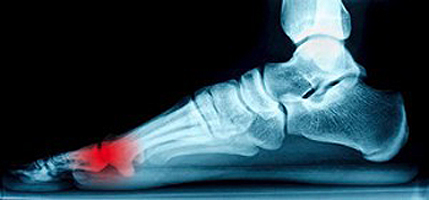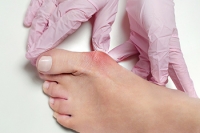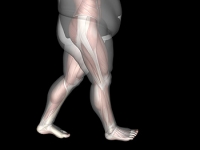 The bones that are found surrounding the joints in the foot are referred to as sesamoid bones. Research has confirmed the big toe contains different types of these particular bones and they have specific functions, which includes providing stability while walking. If an injury should occur to one or more of these bones, inflammation is likely to develop and this typically results in severe pain and discomfort. This is referred to as sesamoiditis, and generally occurs from repetitive activity that may be associated with dancing, basketball, or tennis. Patients who experience this condition often notice gradual pain developing in the foot, in addition to swelling and tenderness surrounding the affected joint. The first phase of treatment will often include rest and cessation from the activity that has caused this ailment. It’s suggested to speak to a podiatrist if you are afflicted with sesamoiditis for further treatment options that are correct for you.
The bones that are found surrounding the joints in the foot are referred to as sesamoid bones. Research has confirmed the big toe contains different types of these particular bones and they have specific functions, which includes providing stability while walking. If an injury should occur to one or more of these bones, inflammation is likely to develop and this typically results in severe pain and discomfort. This is referred to as sesamoiditis, and generally occurs from repetitive activity that may be associated with dancing, basketball, or tennis. Patients who experience this condition often notice gradual pain developing in the foot, in addition to swelling and tenderness surrounding the affected joint. The first phase of treatment will often include rest and cessation from the activity that has caused this ailment. It’s suggested to speak to a podiatrist if you are afflicted with sesamoiditis for further treatment options that are correct for you.
Sesamoiditis is an unpleasant foot condition characterized by pain in the balls of the feet. If you think you’re struggling with sesamoiditis, contact Brent Harwood, DPM of Southeast Podiatry. Our doctor will treat your condition thoroughly and effectively.
Sesamoiditis
Sesamoiditis is a condition of the foot that affects the ball of the foot. It is more common in younger people than it is in older people. It can also occur with people who have begun a new exercise program, since their bodies are adjusting to the new physical regimen. Pain may also be caused by the inflammation of tendons surrounding the bones. It is important to seek treatment in its early stages because if you ignore the pain, this condition can lead to more serious problems such as severe irritation and bone fractures.
Causes of Sesamoiditis
- Sudden increase in activity
- Increase in physically strenuous movement without a proper warm up or build up
- Foot structure: those who have smaller, bonier feet or those with a high arch may be more susceptible
Treatment for sesamoiditis is non-invasive and simple. Doctors may recommend a strict rest period where the patient forgoes most physical activity. This will help give the patient time to heal their feet through limited activity. For serious cases, it is best to speak with your doctor to determine a treatment option that will help your specific needs.
If you have any questions please feel free to contact one of our offices located in Fairhope, Brewton, and Atmore, AL . We offer the newest diagnostic and treatment technologies for all your foot care needs.
Read more about Sesamoiditis







